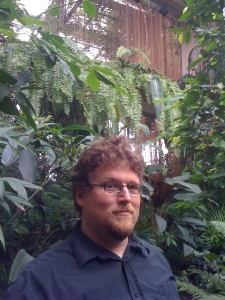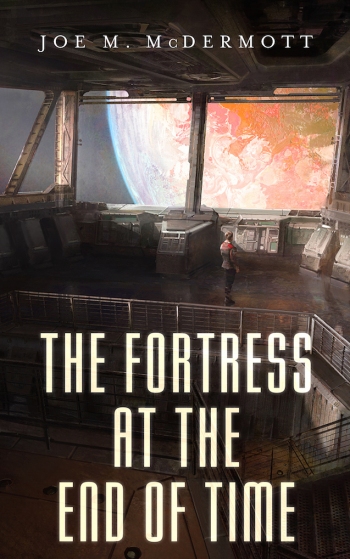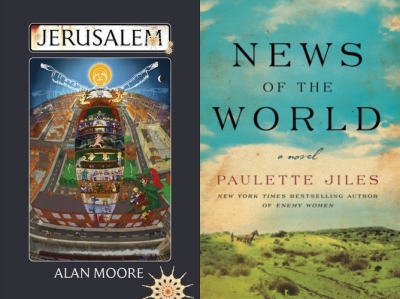 Let’s start with an introduction: Who is Joe M. McDermott?
Let’s start with an introduction: Who is Joe M. McDermott?
That’s who I am when I write fantasy novels. I’m going by Joe M. McDermott, these days, in part because I am tired of people I have known for years calling me “Jim.”
Your new novella, The Fortress at the End of Time, will be published by Tor.com in January 2017. It looks really interesting: How would you introduce it to a potential reader? Is it part of a series?
Larry Nolen, of OF Blog of the Fallen, recommended a book to me, that I loved, and which led me to another book, which I also loved. The first book was The Tartar Steppe by Dino Buzzati, an old Italian Surrealist anti-war book. On the Amazon recommended page, there was also a fascinating book called The Opposing Shore by Julian Gracq, a French classic of SF. I loved them both, and thought about how they were better military fiction than the military fiction I was reading, because it was more about dealing with the idea of the military, the way the bureaucracy and culture press down on the soul and psyche, than about any great acts of violence. In fact, what little violence occurs is often absurd, abrupt, and misinterpreted by everyone in power. I thought about taking some of those ideas into deep space, not just imaginary cities. The isolation of space, and the way a deep space colony would push down on everyone’s mind, would be, I thought, an interesting update to the ideas presented by these old European classics of the early and mid twentieth century.

What inspired you to write the novella? And where do you draw your inspiration from in general?
First, let me say that this book is not a novella. It’s definitely a novel. In general, I draw my inspiration from my inability to change the world. I write instead of standing on a street corner and shouting at passing cars. I write instead of assassinating the wicked in some kind of garish superhero costume. I write impotently, and change nothing, but I write.
How were you introduced to genre fiction?
My father is a huge reader of Science Fiction and Fantasy. He is a very active library patron, his whole life. He took us to the library every week, and to a bakery right afterwards. (I also love baking!)
How do you like being a writer and working within the publishing industry?
I love the independence, but I hate the isolation. I don’t think anyone is within the publishing industry, as some sort of hulking monolith. It’s a fractured, fragmented thing, with lots of outliers and odd places, even inside the major publishers. There are books that sell millions of copies that I’ve never heard of to audiences as alien to me, creatively, as actual aliens. I guess I feel like we’re all on our archipelagoes, carving our Easter Island Heads for no one in particular, hoping history will gape upon them after we are gone.
Do you have any specific working, writing, researching practices?
I find that different processes produce different results, and I am uninterested in doing the same thing over and over again for fifty years. I try to adjust each book or story to a process that suits it. Fortress At The End of Time was actually written by hand, first. It slowed down the voice and gave it a very confessional tone, that I thought was appropriate. I was working at a Christian Bookstore, at the time, which is closed down, now. It was slow. I was encouraged and permitted, when the store was clean and empty, to sit at the register with my notepad and do some good work. I miss the store. I just went in and visited with some old co-workers at their new business across town. I actually adopted the store cat, too.
When did you realize you wanted to be an author, and what was your first foray into writing? Do you still look back on it fondly?
I don’t want to be an author. I don’t know if I ever did. I am a person. The book exists independent of me, who wrote it. I have no interest in fame or fame culture or being recognized or adored by people I don’t know. I’ve been writing and scribbling away as long as I can remember. In high school (this was a private, Catholic School, so we bought our own books), I filled the margins with doodles and poems and fragments. I’ve been pushing words out a long time. I don’t really look back on school, fondly. High School is a thing we all must endure, and it’s mostly horrible, but it’s a bearable horror, and you get through it and get on with life.
What’s your opinion of the genre today, and where do you see your work fitting into it?
I think the genre is the mainstream, now. It used to be this fringe, like an independent music scene, like Grunge in Seattle before Nirvana, or Mo-Town before Mo-town went national. It used to be this sound that was not widely accepted, perhaps widely mocked. Now our biggest movie franchises are comic book superheroes. Our smartest, most beautiful and artistic films, are about learning to talk to aliens. Our greatest lights, our Jeff VanderMeers and Kelly Links and Gene Wolfes, are written about in the New Yorker, celebrated amongst the pages of every serious critic in the world. Ursula le Guin might win a Nobel. On TV, everywhere you look, fantasy and science fiction. Everyone is a geek, now. That outsider energy that had built up for years has dispersed into the mainstream. And, like Motown, it becomes a sound that any performer can pick up and put down and dance through, before pushing off to some other sound. If the genre will continue as a genre, and not as a parody of itself dispersed into the mainstream that will grow tired of it, cast it off for something new, as the mainstream does, than that outsider energy, that community apart from the mainstream, must be renewed, refocused, and remade away from the eyes of the world.
I don’t think I fit into the mainstream, and I don’t think I fit into the outsider energy that I have seen building up around Bizarro Fiction and Horror. I don’t think I fit in at all.
Do you have any other projects in the pipeline, and what are you working on at the moment?
I prefer not to discuss things in process, but it does involve fantasy, necromancy, and sea salt.
What are you reading at the moment (fiction, non-fiction)?
I’m almost through Alan Moore’s HUUUUUGE book, Jerusalem, and I sort of love it. Sort of. I wonder, though, in my mind, why it feels fairly common for male authors to build up to this place where they write their Ulysses, their huge, difficult thing. Their big, huge art manifesto. Women authors don’t seem to do that with the same regularity, that I can tell. Women authors should be doing this, too. I hope I’m wrong. I’m reading a lot of Westerns, right now, as well. Paulette Jiles is amazing.

If you could recommend only one novel to someone, what would it be?
I don’t think anyone should read novels if they are only going to read one.
What’s something readers might be surprised to learn about you?
I’m very boring. People who know me and my wife often ask me, longingly, when she’s not around, why she isn’t there. Could she be there? Is she coming? Please, bring your wife next time? PLEASE? She’s a lot cooler than me, and a lot more fun.
What are you most looking forward to in the next twelve months?
I’ve got a pretty extensive little orchard going on our little suburban lot. I’m about to get our very first blood oranges on a tree I’ve been keeping alive, and it’s my favorite fruit in the world. Naturally, I’m ecstatic to finally get some fresh of the tree. Grocery store blood oranges tend to be watery and mealy, real hit or miss. I’m expecting more plums, this year, too, but never count your fruit until the possums take their tithe.
*
Joe M. McDermott‘s The Fortress at the End of Time is published by Tor.com, and will be available in the UK as well. Here’s the synopsis:
Captain Ronaldo Aldo has committed an unforgivable crime. He will ask for forgiveness all the same: from you, from God, even from himself.
Connected by ansible, humanity has spread across galaxies and fought a war against an enemy that remains a mystery. At the edge of human space sits the Citadel—a relic of the war and a listening station for the enemy’s return. For a young Ensign Aldo, fresh from the academy and newly cloned across the ansible line, it’s a prison from which he may never escape.
Deplorable work conditions and deafening silence from the blackness of space have left morale on the station low and tensions high. Aldo’s only hope of transcending his station, and cloning a piece of his soul somewhere new is both his triumph and his terrible crime.
For more on Joe’s writing and fiction, be sure to check out his website/blog, and follow him on Goodreads.
[…] on CR: Interview with Joe M. McDermott […]
LikeLike
[…] continue here: https://civilianreader.com/2016/12/12/interview-with-joe-m-mcdermott/ […]
LikeLike